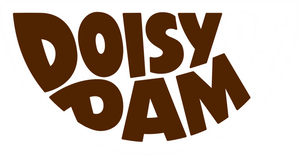August 19th every year sees International Orangutan Day. Why do we care? Well, we're huge fans of both chocolate AND the rainforest - the home of the mighty orangutan.
Unfortunately, the rainforests (especially those in Borneo and Indonesia) are made up of huge swathes of oil palm plants, and due to increasing demand for palm oil, these rainforests are being deforested and lost at a rate of two football stadiums a day. This makes for a lot of homeless orangutans, and a huge dent in biodiversity in the ecosystem.
So what's the deal with palm oil?
If you’ve ever glanced at the little palm tree in the corner of our packaging and thought you’d like to know more, then you’ve come to the right place. “No Palm Oil. No Harm Done.” When Ed and Rich started Doisy and Dam back in 2013, they vowed to never add a drop of palm oil to any of their products. Ever. Perhaps you’re already clued up on the ins and outs of palm oil, perhaps not. Either way, we thought we’d lay our cards on the table so that you can understand why we make the choices we do. We’re pretty proud of our choc, and we want you to be too.
“Palm oil is in nearly everything … pizza, doughnuts, chocolate, deodorant, shampoo, toothpaste, lipstick … it’s in close to 50% of the packaged products we find in supermarkets”, WWF
![]()
Palm oil is the most widely used vegetable oil in the world. It’s in everything, from snacks to household cleaners to cosmetics, and it’s understandable why. It blends well, fries well, stabilises, enhances texture and even extends shelf lives. What’s more, it’s cheap, with bountiful yields making it much more cost-effective than its competitors. When it comes to choc, adding palm oil helps to create that smooth and shiny finish we’ve come to know so well and prevents it from melting. It’s hardly surprising then that the big brands can’t wait to get their hands on the stuff. A miracle ingredient that’s easy on the wallet… what’s not to love?
The problem is, as demand for palm oil grows, so does the space required for which it can grow. The solution? Clearing down some of the world’s most biodiverse forests. Not only does this release a whole lot of CO2 back into the atmosphere, but it displaces indigenous communities, erodes topsoil and pushes endangered species to the brink of extinction. Four things we’d rather steer clear of. Orangutans, the pygmy elephant and the Sumatran rhino are just a few of the species facing dwindling numbers, and that’s not to mention the abundance of bugs and smaller animals that contribute to the ecosystem in their unique way. Although originally from Western Africa, palm oil is now grown throughout Africa, Asia, North America and South America, with plantations covering more than 27 million hectares of the Earth’s surface. Now ordinarily, swaying palm trees would have the whole D&D team swooning, but when it comes to these “green deserts” we want nothing to do with them.
Avoiding palm oil was a pretty simple decision for us. Whilst “sustainable palm oil” does exist, and we fully champion the slow but steady transformation towards it, our thinking is, if you don’t need it, why add it? Lucky for us, great-tasting chocolate doesn’t need palm oil. We’d even go as far as to say that it is better without it. The truth is, for many larger manufacturers, palm oil is simply a cheaper alternative to cocoa butter. But subbing the fruity, nutty tones of cocoa butter for a nearly tasteless fat seems ludicrous to us. We’ve never been one to add an ingredient where it’s not needed. We believe less is more. And sure, this may make the task of getting an irresistible shine or silky nut butter that little bit trickier, but when have we ever let a challenge stop us before? Thanks to Hannah, we’d like to think we’re doing a pretty good job.
It’s worth adding that we do not think boycotting palm oil in all walks of life is the right answer. There are some products that need palm oil and have no viable alternative, or where the alternatives are even more damaging. When buying these, just make sure to look out for those who use palm oil certified under the Roundtable on Sustainable Palm Oil (RSPO) to ensure the palm oil has been sourced in a way that you can shout about.
8 years down the line, we’re proud to say that no palm oil has ever been added to our choc. Never has, never will. We know how difficult it can be for consumers to know what they are getting, or to really feel that they are making the right choices. With palm oil masquerading as “vegetable oil” and long names like “Sodium Laureth Sulfat,” labels are cryptic enough as they are. For your sake, and ours, we prefer to keep things simple. No palm oil. No confusion. No harm done.

